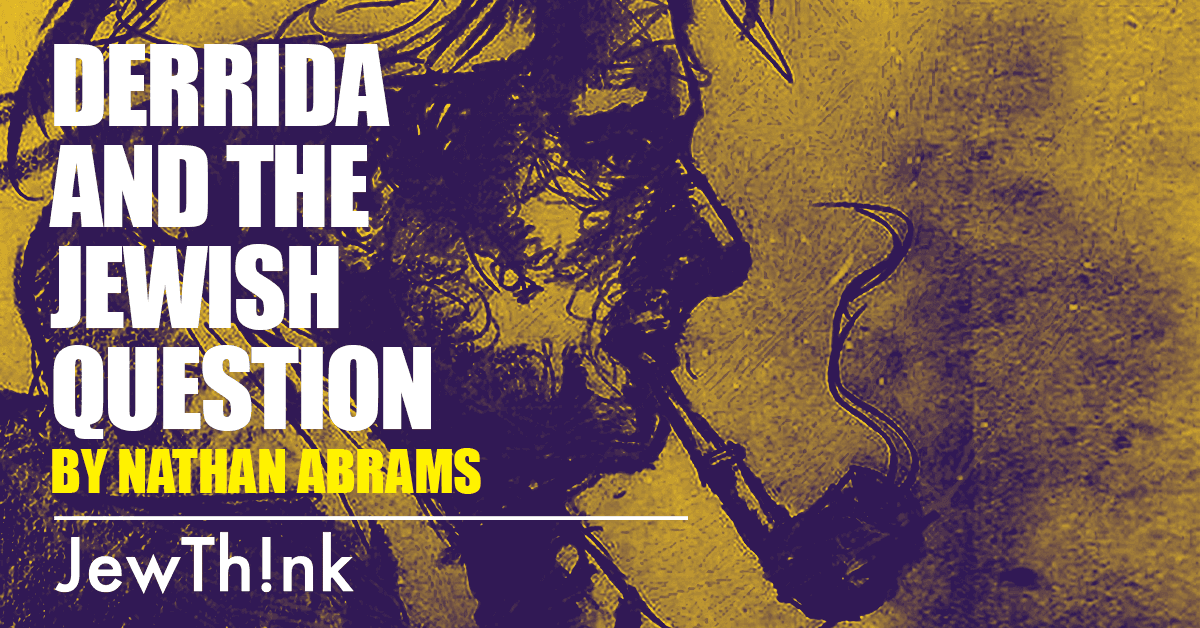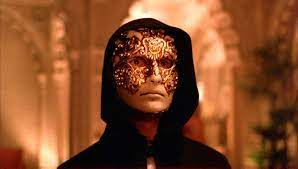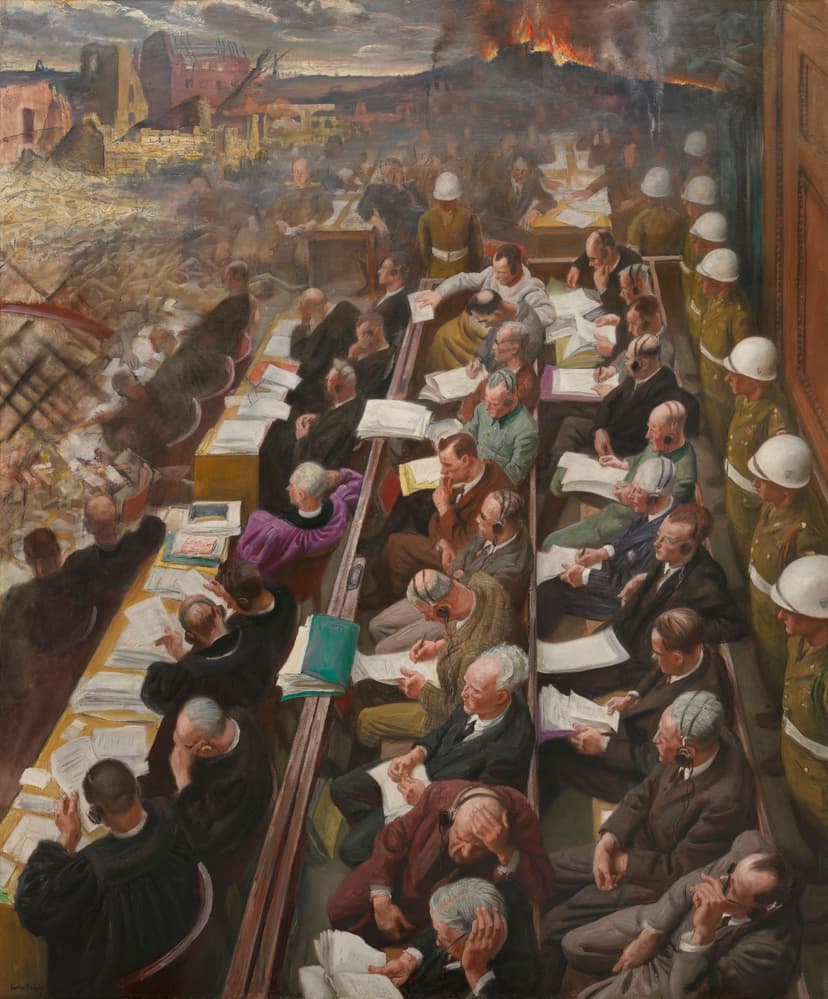Derrida and the Jewish Question

Nathan Abrams reviews a new biography of French-Jewish philosopher Jacques Derrida.
Like Marmite, the philosopher Jacques Derrida divides opinion. Where some see a genius, others perceive a charlatan and a fraud. The English philosophical tradition is particularly opposed to him. But how did this French-Algerian Jewish kid (I use the term deliberately which will become clear shortly) become the most famous philosopher on the planet?
[Image: https://i1.wp.com/www.jewthink.org/wp-content/uploads/2020/12/81xjXr7uaUL.jpg?fit=1689%2C2551&ssl=1]An Event, Perhaps: A Biography of Jacques Derrida, by Peter Salmon.
The answer is outlined in Peter Salmon’s new biography of Jacques Derrida which, far from hagiographic, also helps to explain the importance of Derrida’s Jewishness to his thought and career.
The Kid
[Image: https://i2.wp.com/www.jewthink.org/wp-content/uploads/2020/12/JacquesDerrida-scaled.jpg?fit=1825%2C2560&ssl=1]Portrait of Derrida, by Shigeru Ito. See more here: https://www.shigeruito.com/
Born in Algiers, in 1930, Jackie was named after Jackie Coogan, the star of Charlie Chaplin's 1921 movie The Kid. His father Haïm Aaron Prosper (Aimé) Derrida was a wine merchant who came from a Sephardic family with roots in Toledo in Spain.
Derrida grew up in the French north African colony of Algeria where identity was a complex issue. All French people who were neither Jewish, Berber or Arab were called ‘Catholics’ regardless of which denomination they actually belonged to while Jews were seen as ‘Arabs of the Jewish faith’. By 1870, though, Jews enjoyed greater rights than the majority Muslim population, as they were granted French citizenship by a decree which brought their rights in line with the rest of the pied-noir (literally, ‘black foot’, that is, shoe-wearing) population of Algeria. This did not mean they were any more accepted (or acceptable), however.
[Image: https://i0.wp.com/www.jewthink.org/wp-content/uploads/2020/12/4139685-WQODAUIG-7.jpg?fit=770%2C826&ssl=1]Drawing: Pencil on Paper, by Dwijoko Harianto. See more works here: https://www.saatchiart.com/djhar
This became starkly clear when, in 1940, Jewish citizenship was revoked and the Jews of Algeria, who then numbered some 120,000, became non-citizens. It was not a decision imposed by the Nazis but by French Algerians, reflecting the virulence of Algerian Vichy antisemitism. The following year, quotas were introduced into schools and only 14% of the children could be Jewish. This was a system not implemented in France proper. Then, a year later the quota was reduced again to 7%, and Jackie was sent home. For him, it was catastrophic, akin to a natural disaster like an earthquake for which there was no explanation. It was a wound that never healed.
[Image: https://i2.wp.com/www.jewthink.org/wp-content/uploads/2020/12/tumblr_pb1umnzfeJ1qe866ho1_1280.jpg?fit=960%2C720&ssl=1]Derrida playing Cricket, year unknown
Jackie was now forced suddenly to study at an exclusively Jewish school set up by Jewish teachers who themselves have been forced out of their teaching positions by the very quotas that excluded him. He hated every minute of it. He regularly skipped class to play sport, chase girls and visit the cinema. For a child, who had never left Algiers, cinema offered solace, sanctuary, and escape.
In November 1942, the allied forces landed in North Africa and Algeria became the capital of free France, but it took another year for Jewish citizenship to be reinstated. The fall of Vichy France in September 1944, however, did little to ease tensions in Algeria and Derrida was caught between the antisemitism of the pieds-noirs and rising Arab nationalism.
[Image: https://i1.wp.com/www.jewthink.org/wp-content/uploads/2020/12/6965982-GOWBXFXG-7.jpg?fit=770%2C1026&ssl=1]Having a cup of coffee with Jacques Derrida Drawing by Burak Kum. See more here: https://www.saatchiart.com/account/profile/1649414
In 1949, he left Algeria for the first time. It was almost a rebirth: during the sea passage he spent the entire time vomiting before being spat out in Marseille from where he journeyed to Paris. Thus Jackie became Jacques, beginning his intellectual journey from being virtually unknown in October 1966 when he stepped on a stage at the Johns Hopkins University in Baltimore to give a talk that marked the birth of deconstruction to intellectual superstardom.
Derrida and the Jewish Question
In 2004, Derrida uncharacteristically told a joke. A French citizen, a German citizen and a Jew are shipwrecked on an island. The only other living creatures are elephants. Bored, one of them suggests they write about the elephants. A week later, the French returns with a short, bright, brilliant but superficial essay on the elephants’ libidos. Three months later, the German comes back with a large scientific tome, with an interminable title, on their ecology and classification. The Jew hasn’t written anything, apologising that he needs more time. A decade later, he produces his volume, ‘Elephants and the Jewish Question’.
[Image: https://i0.wp.com/www.jewthink.org/wp-content/uploads/2020/12/Jacques-Derrida-CC-BY-2.0-Flickr-by-thierry-ehrmann.jpg?fit=800%2C536&ssl=1]Jacques Derrida, painted portrait. Photo: Thierry Hermann, Flickr
Derrida was part of a milieu of other Jewish thinkers whose work influence, including Helene Cixous and Emmanuel Levinas. He struck up a particularly close friendship with Cixous who, like him, was Algerian and Jewish.
[Image: https://i2.wp.com/www.jewthink.org/wp-content/uploads/2020/12/20171024_111652-1024x576-1.jpg?fit=1024%2C576&ssl=1]Peter Salmon
To impose a purely Jewish reading on Derrida, Peter Salmon argues, is to do 'a fundamental violence' to the scope of his thinking. But from his earliest works onwards, he was always open to the claims of Jewish thought in ways that were profoundly and radically vital to his ideas. Given his background, it is no surprise that he wrote about the difficulty of being a Jew.
[Image: https://i0.wp.com/www.jewthink.org/wp-content/uploads/2020/12/Portrait_of_Jacques_Derrida.jpg?fit=1420%2C1268&ssl=1]Portrait of Jacques Derrida, by Steve Infantino. See more art by Steve here: www.steveinfantino.net
Derrida was never strictly an atheist. He asserted the constancy of God in his life but one that is called by other names. 'Derrida always resisted being cast as a "Jewish philosopher" but without ever renouncing his fascination with Jewish thought or downplaying its influence on his own’, writes Salmon.
[Image: https://i1.wp.com/www.jewthink.org/wp-content/uploads/2020/12/616279_489580107736785_801632470_o.jpg?fit=2048%2C1270&ssl=1]Vittorio Pelosi's painting 'The School of Postmodernism', inspired by Raphael's The School of Athens, is one of the best known paintings to come out of the Intentist movement and replaces all of Raphael's Athenian philosophers with Postmodern icons. Photo: https://www.facebook.com/intentism/photos/?ref=page_internal
He explored Jewish themes and questions in his work and his philosophy was attentive to language, full of punning, wit and wordplay. His work is full of terms that carry with them Jewish connotations leading some to notice a stylistic similarity between his writings and the Talmudic commentaries. For Derrida (and others), the Talmud allowed for a new system of thought outside of the Western philosophical tradition.
His work was always latently Jewish and sometimes it was explicit. In his essay, ‘A Silkworm of One's Own’, for example, he teases out an emotional and symbolic relationship to his tallit, the prayer shawl which his maternal grandfather gave him. In ‘Circumfession’, he writes in detail and depth about his own circumcision.

But when it came to the work of those philosophers whose work he admired and their Nazi views, the lines in Derrida’s thought became blurred and evasive. Martin Heidegger’s association with and participation in Nazism was treated as a dirty secret but Derrida neither outright condemned him nor distanced himself from his work.
The issue became more acute with his friend Paul de Man. Because he and Paul de Man were friends, it put Derrida in a tricky position worsened by the fact de Man was a leading thinker of deconstruction, the philosophy which Derrida had pioneered. His response ‘displayed precisely the sort of relativism and moral slipperiness of which deconstruction often stood accused’, writes Peter Salmon.

Near the end of the book, Salmon reveals that Derrida had a secret name, Élie, given to him at his circumcision but not recorded on his birth certificate. This hidden but unofficial name was unknown even to himself for many years. It is his founding secret.
To return to where we began, in naming his opening chapter, ‘The Kid’, Peter Salmon misses a trick. The moniker often stood in as a reference to a boxer’s Jewishness, as in ‘the Yid’. One could further pun that in doing so, Salmon’s removal of the id-Yid from the kid that is Derrida is an absence, an aporia.
[Image: https://i0.wp.com/www.jewthink.org/wp-content/uploads/2020/12/70ceacf811d631ebcb1e2707c7067e30.jpg?fit=1435%2C1404&ssl=1]Jacques Derrida Drawstring Bag, designed by savantdesigns. See more here: https://www.redbubble.com/people/savantdesigns/shop
An Event, Perhaps: A Biography of Jacques Derrida by Peter Salmon is published by Verso, £16.99.





